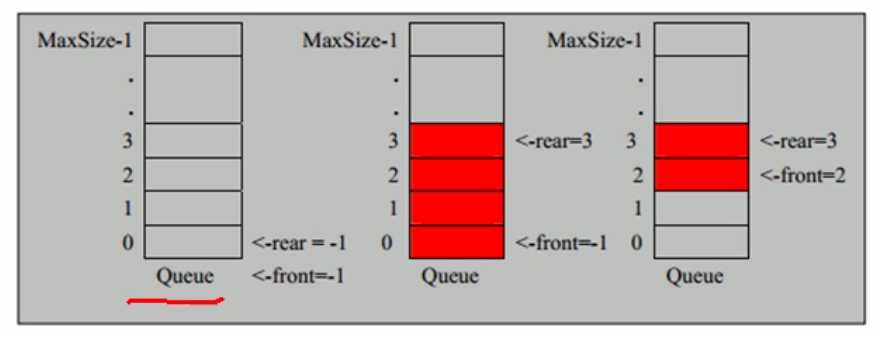数组模拟队列
2020-12-13 14:02
标签:except cep 下标 用户 val als 变量 return runtime 队列本身是有序列表,若使用数组的结构来存储队列的数据,则队列数组的声明如下图。其中,maxSize 是该队列的最大容量。 因为队列的输出、输入是分别从前后端来处理,因此需要两个变量 front 及 rear 分别记录队列前后端的下标, front 会随着数据输出而改变,而 rear 则是随着数据输入而改变。如图所示: 当将数据存入队列时称为 “addQueue”,addQueue 的处理需要有两个步骤:思路分析: (1)将尾指针往后移:rear+1,当 front == rear 【空】 (2)若尾指针 rear 小于 队列的最大小标 maxSize-1,则将数据存入 rear 所指的数组元素中,否则无法存入数据。rear == maxSize-1【队列满】 代码实现: 问题分析并优化: (1)目前数组使用一次就不能使用,没有达到复用的效果。 (2)将这个数组使用算法,改进成一个环形的数组。 数组模拟队列 标签:except cep 下标 用户 val als 变量 return runtime 原文地址:https://www.cnblogs.com/niujifei/p/11550025.html数组模拟队列



1 public class ArrayQueueDemo {
2
3 public static void main(String[] args) {
4 // 测试
5 // 创建一个队列
6 ArrayQueue queue = new ArrayQueue(3);
7 char key = ‘ ‘; // 接收用户输入
8 Scanner scanner = new Scanner(System.in);
9 boolean loop = true;
10
11 // 输出一个菜单
12 while(loop) {
13 System.out.println("s(show):显示队列");
14 System.out.println("e(exit):退出程序");
15 System.out.println("a(add):添加数据到队列");
16 System.out.println("g(get):从队列取出数据");
17 System.out.println("h(head):查看队列头数据");
18
19 key = scanner.next().charAt(0); // 接收一个字符
20 switch (key) {
21 case ‘s‘:
22 queue.showQueue();
23 break;
24 case ‘a‘:
25 System.out.println("输入一个数");
26 int value = scanner.nextInt();
27 queue.addQueue(value);
28 break;
29 case ‘g‘:
30 try {
31 int res = queue.getQueue();
32 System.out.printf("取出的数据是%d\n",res);
33 } catch (Exception e) {
34 System.out.println(e.getMessage());
35 }
36 break;
37 case ‘h‘:
38 try {
39 int res = queue.headQueue();
40 System.out.printf("队列头的数据是%d\n",res);
41 } catch (Exception e) {
42 System.out.println(e.getMessage());
43 }
44 case ‘e‘:
45 scanner.close();
46 loop = false;
47 break;
48 default:
49 break;
50 }
51 }
52 System.out.println("程序结束");
53 }
54
55 }
56
57 // 使用数组模拟队列-编写一个ArrayQueue 类
58 class ArrayQueue {
59 private int maxSize; // 表示数组的最大容量
60 private int front; // 指向队列头
61 private int rear; // 指向队列尾
62 private int[] arr; // 该数据用来存放数据,模拟队列
63
64 // 创建队列的构造方法
65 public ArrayQueue(int arrMaxSize) {
66 maxSize = arrMaxSize;
67 arr = new int[maxSize];
68 front = -1; // 指向队列头部,分析出 front 是指向队列头的前一个位置
69 rear = -1; // 指向队列尾,指向队列尾的数据(即就是队列最后一个数据)
70 }
71
72 // 判断队列是否满
73 public boolean isFull() {
74 return rear == maxSize - 1;
75 }
76
77 // 判断队列是否为空
78 public boolean isEmpty() {
79 return rear == front;
80 }
81
82 // 添加数据到队列
83 public void addQueue(int n) {
84 // 判断队列是否满
85 if (isFull()) {
86 System.out.println("队列已满,不能加入数据");
87 return;
88 }
89 rear++; // 让 rear 后移
90 arr[rear] = n;
91 }
92
93 // 获取队列的数据,出队列
94 public int getQueue() {
95 // 判断队列是否空
96 if (isEmpty()) {
97 // 通过抛出异常
98 throw new RuntimeException("队列空,不能取数据");
99 }
100 front++;
101 return arr[front];
102 }
103
104 // 显示队列的所有数据
105 public void showQueue() {
106 // 遍历数组
107 if (isEmpty()) {
108 System.out.println("队列为空,没有数据");
109 return;
110 }
111
112 for (int i = 0; i ) {
113 System.out.printf("arr[%d]=%d\n", i, arr[i]);
114 }
115 }
116
117 // 显示队列的头数据,不是取出数据
118 public int headQueue() {
119 if (isEmpty()) {
120 throw new RuntimeException("队列为空,没有数据");
121 }
122 return arr[front + 1];
123 }
124
125 }